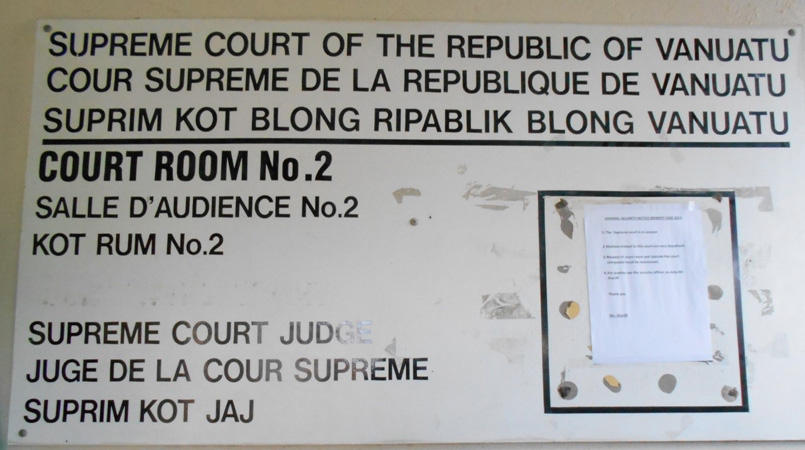
The Vanuatu Supreme Court will hand down its decision on the legality of the dissolution of Parliament on Wednesday, 16 December
The date was set by Justice Dudley Aru after hearing the application from the 25 applicants who were former opposition MPs, a newly MP-elect, as well as the president’s legal counsel and the Attorney General.
Seven points were raised in the constitutional case. They include the gravity of the president’s prerogative powers, the legality of the Council of Ministers that decided on the dissolution of parliament, the delay of action by the president after receiving the advice from the Council of Ministers on the dissolution, and the lack of compliance with the government act on the part of the Council of Ministers.
The constitutional rights of the MP-elect, Kenneth Natapei was also brought up in court.
The applicants say the delay on the part of the president to dissolve parliament after receiving the advice of the Council of Ministers was because he was waiting for the outcome of the court of appeal. They claim, had the appeal court gone in favor of the government side, president Baldwin Lonsdale would not have dissolved parliament.
They further argue that the information on finance provided to the president by the Council of Ministers did not comply with the Government Act because the Council of Minister had failed to seek advice from the Attorney General and Director General of Finance on the actual financial positions.
15. ATTORNEY GENERAL AND DIRECTOR-GENERAL OF FINANCE
(1) Where applicable Council must not consider a submission unless it has been approved by:
(a) the Attorney-General as to the legal aspects; and
(b) the Director-General of the Ministry of Finance and Economic Management as to the financial implications of each submission and its conformity with the principles of responsible fiscal management.
(2) The Attorney-General and Director-General include an employee or officer who performs the functions powers or duties during any vacancy in, absence from or incapacity of, the holder of either office.
The two lawyers for the applicants, Edward Nalyal and Ronald Warsal argue that this act gives effect to the constitution
CHAPTER 7 – THE EXECUTIVE
39. Executive power
(1) The executive power of the people of the Republic of Vanuatu is vested in the Prime Minister and Council of Ministers and shall be exercised as provided by the Constitution or a law.
In response, both the legal counsel for the President, Ishmael Kalsakau and the Attorney General on behalf of the Council of Ministers, focused their defense on the two former appeal court decisions in 20014 and 1998 that the council of Ministers supersedes the rights of the MPs in parliament.
“In our judgment a course of action which had the effect of denying Members of Parliament their right ‘to express an unfavourable opinion in the Government leadership’ cannot be elevated to a priority over the right of the Council of Ministers to advise the President that Parliament should be dissolved and the constitutional right of a President (having received such advice) to exercise the responsibility vested in him under the Constitution. We are of the view that the right of the people of Vanuatu to democratically express their view in the election of a new Parliament must be accorded the priority. Article 43 is not one of those Articles which is specifically covered by Article 5. The right which Members of Parliament have under Article 43, is a right which exists only if Parliament exists. It is to allow the tail to wag the dog to suggest that the rights of the Members of Parliament ought to be accorded priority over the rights of the people to elect a new Government when the President, having exercised the provisions of the Constitution, has determined that Parliament should be dissolved.”
……..The Court also said:-
“Article 28 (3) vests a wide and extensive discretion in the President. There is a heavy burden on anyone who asserts that there has been an improper exercise of that discretion. We are not satisfied that the Petitioners discharged that burden in the Supreme Court. Where the Constitution provides such a wide and unfettered discretion it is necessary to show that in legal terms the decision taken by the President was irrational and unsustainable. That has not been established on the evidence presented.”
Ishmael Kalsakau told the court the president’s power cannot be defined as a “robot”.
The two defense counsels say Article 28 (3) of the constitution on separation of powers between executive and legislature, gives power to the president and supersedes all other acts including the government act referred to by the applicants.
They claim the arguments from the applicants clearly undermines provisions of the constitution because the power of the president only derives from the constitution and not any other laws.
On the question of whether or not the Council of ministers did have a quorum on 15 October when it decided on the dissolution of parliament, they both said the constitution was silent on whether a two-third majority of members were required to approve an agenda, so they submit that even 7 ministers are eligible to make legal decisions in a council meeting.
Legal counsels for the Attorney General and for the president then submitted that the application failed to prove that the president had unconstitutionally dissolved parliament.
They put to the court that the Head of State had acted lawfully when exercising his prerogative power to dissolve parliament on 16 November 2015.
